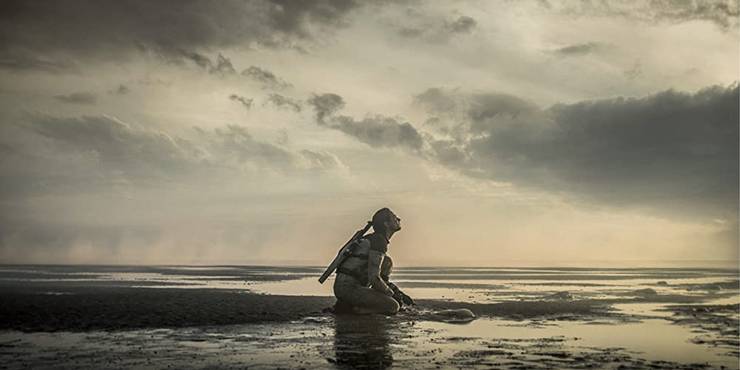The post-apocalyptic 2021 sci-fi film The Colony, also known as Tides, has potential; however, the movie is plagued by the sort of fundamental problems that render a film completely devoid of entertainment value. Science fiction can be dry — particularly the more cerebral stories — and there are many ways that a solid premise can go horribly wrong. The Colony is a prime example of this: the depressing future dystopia is an interesting concept, but the uneven plotting, underdeveloped characters, and lack of internal logic make the movie impossible to enjoy.
Written and directed by Tim Fehlbaum, The Colony is a German-Swiss action-thriller set in the future, after a global catastrophe has rendered the planet inhospitable. Although “elite” members of the human race managed to flee into space and colonize Kepler, mysterious forces eventually caused infertility among the colony. A team — the Ulysses — was sent to Earth to see whether or not it was safe for re-colonization. The mission was presumed to have been a failure when the astronauts failed to send a message back to their people. Years later, a second party — the Ulysses 2 — is sent to Earth to try again. Nora Arnezeder stars as Blake, a medical expert with Ulysses 2 and the daughter of one of the astronauts from the original mission.

In a (not so) surprise twist, Blake and the only other surviving member of her crew, Tucker (played by Ṣọpẹ Dìrísù) are ambushed by humans who survived the apocalypse. Blake is thrilled to discover that these humans are procreating — her team had been sent to monitor the “fertilization” potential of whatever life is left on Earth, and no doubt they did not expect to find mammals, let alone human beings. Blake befriends the young girl Malia (Bella Bading), and when the child is kidnapped by Gibson (Iain Glen), Blake decides to help the mother, Narvik (Sarah-Sofie Boussnina) rescue her.
Fehlbaum does an admirable job world-building in The Colony, presenting a version of Earth that is largely immersed underwater and at the mercy of the rising and falling tides (hence the original title). Unfortunately, the overall aesthetic used to dramatize the harsh, often soggy, reality of this new Earth is visually unappealing. The approach makes sense: this is a world largely devoid of life, and the soaked, decaying remains of society are dramatized by the monochromatic sets and heavy use of fog. The problem is, however, that the whole movie is like this — even the flashbacks to Kepler rely heavily on cool tones, blurry visuals and overly bright lights. The colors in every scene all run together like ink on a wet newspaper. This might have been a thematic choice, but in terms of cinema, it’s neither original enough to be compelling nor dramatic enough to be memorable. At most, the overall impression is thin and insubstantial, much like the film itself.

The plot in The Colony is convoluted. The movie begins with an awkward sequence that intercuts a high-stakes, fiery shuttle landing with silent frames of text (stylized a bit like silent movie intertitles — likely accidentally) that dump a lot of exposition on the audience. But even with the expository information from the title cards, it’s never immediately clear what’s going on, why any of the characters are doing what they’re doing, or what the stakes are. Events occur mainly to set up later plot points; some contrivances are fine, but the primary story structure needs to have an underlying logic. Characters are constantly explaining themselves, but even that doesn’t help make the movie less confusing because there’s no motivation dictating the action, the sequence of events feels random and, at times, redundant. In short, The Colony is more of an idea than a story.
The mix of bland visuals with bleak storytelling makes The Colony an unpleasant experience. Hardcore fans of the genre may appreciate the story’s dedication to the basic tropes — the “twist” of the original astronaut who turns out to be a corrupt megalomaniac, the attempted sexual assault scene, the many, many shots of a mushy, gray, lifeless environment, and the constant threat of violence. But most audiences will be bored out of their wits. The Colony utterly fails as a thriller, and, much like the environment the main character finds herself in, is mostly a slog.
The Colony premiered at the 71st Berlin International Film Festival and was released in North America by Saban Films on August 27, 2021. It is 104 minutes and is rated R for some violence.
- The Colony (2021)Release date: Aug 27, 2021
About The Author




